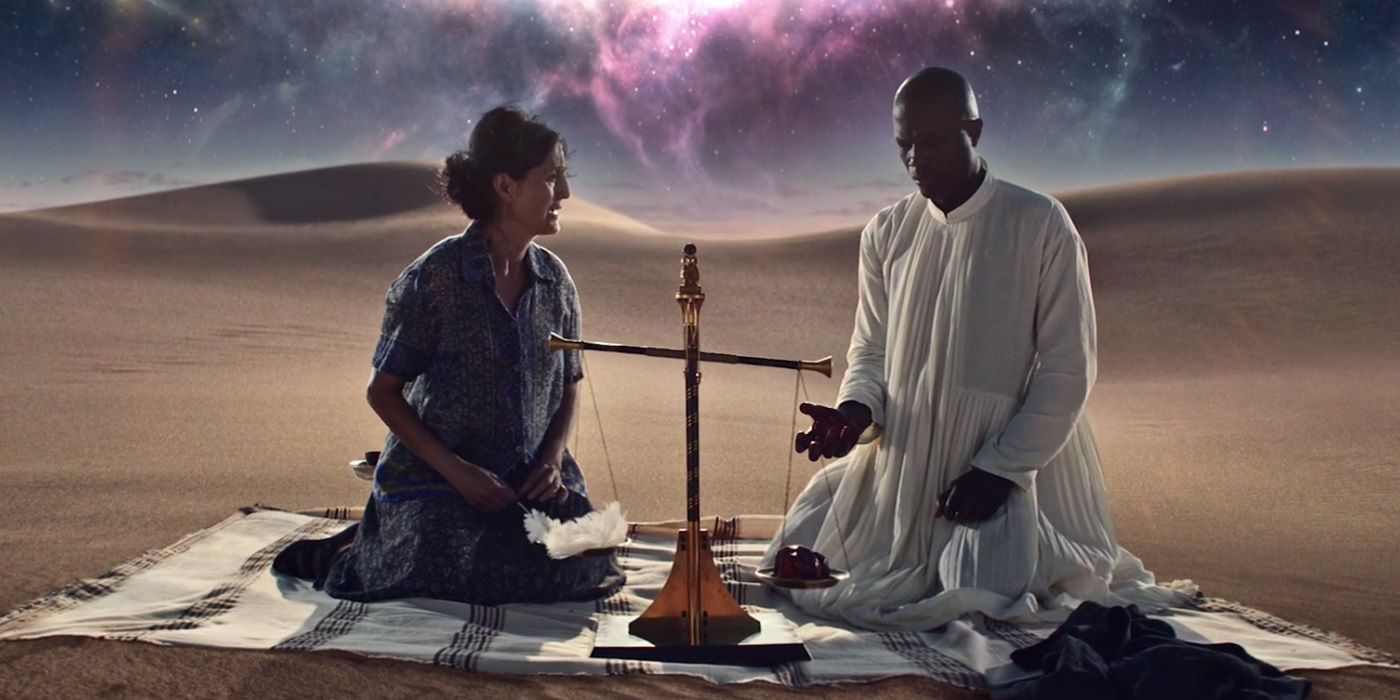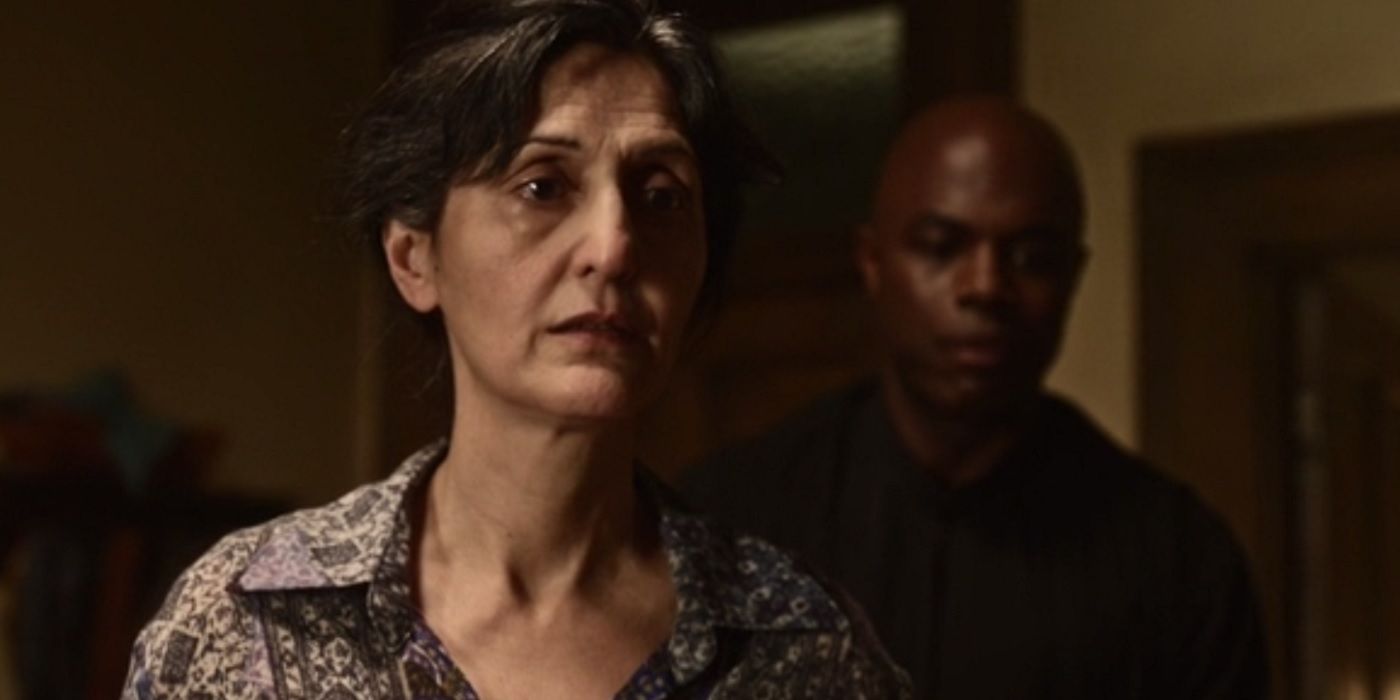Warning: SPOILERS ahead for episode three of American Gods
-
As we move further into the first season of Starz’s American Gods, the roster of gods old and new is widened, and we see the lengths to which the old guard will go in order to remain relevant in a world that has mostly forgotten them. While the scene with the Jinn is arguably the highlight of the most recent episode, its opening offered another striking glimpse into the world of the ancient gods scraping out a living in modern America.
Anubis, the Egyptian god of mummification and the afterlife, is introduced at work. While the modern day sees him working in a funeral parlour with fellow god Ibis - keeping his embalming skills in use - he still finds use for his old ways. The episode opens in Queens, in the house of an Egyptian born woman who stands precariously on a wobbly stool to procure a jar from the top shelf. While she believes nothing terrible has happened, a knock on the door from Anubis (Chris Obi, set to appear in Star Trek Discovery), who also goes by the name Mr. Jacquel, reveals that she did fall and it has killed her. The deceased is an Egyptian immigrant who was taught of the old ways by her grandmother, which is why, despite being Muslim, it is Anubis who comes to claim her after death. He guides her out the fire escape by her apartment window, where the pair ascend the seemingly endless flights of stairs until they reach a cliff top and walk into the desert.
As the god who ushers souls into the afterlife, it is Anubis's job to initiate the weighing of the heart. This was seen as the way the gods would determine the goodness of the dead's soul, and whether they should be granted access to the afterlife. The heart would be weighed against Ma'at (or "truth"), represented by an ostrich feather: If the heart was heavier than the feather then the deceased's soul would be devoured by Ammit, a demon with the head of a crocodile, the torso of a lion and the bottom part of a hippo; if their heart was lighter, then they would ascend to the next life. The woman's heart is deemed "good enough", and she is allowed to pass. As god of embalming, Anubis would be used to this process. Mummification decreed that the heart be left in the body to prepare for the weighing, while other internal organs – lungs, liver, stomach and intestines – would be placed in canopic jars for safekeeping, as they would be needed in the afterlife (the brain, in contrast, was usually disposed of, considered useless after death).
Finally, Anubis guides the woman two five large doors and tells her to choose one through which she can enter the underworld. Unsure of which to pick (her only desire is that she avoids her abusive father), she asks Anubis to choose for her. The choice is made and she walks on. After a moment of hesitation, her pet cat pushes her in, and the journey is complete. Cats were incredibly important in ancient Egyptian mythology, and the cat goddess Bastet was the symbol of protection and family, among other traits. It is implied that the woman’s cat is Bastet, and later in the novel we see the wider role of the cat in Messrs. Ibis and Jacquel’s world. In the Old Kingdom of Egyptian lore, dating back to 2600 - 2000 BC, Anubis was the most important god of the dead, but was replaced by Osiris during the Middle Kingdom era of 2000 - 1700 BC. As well as embalming bodies and guiding souls to the afterlife, Anubis would protect tombs and cemeteries from danger.
Most of the encounters with gods on the show so far have been through acts of worship, or a bastardized version of it: Bilquis with her bedfellows, Anansi inciting rebellion on the slave ship, the Jinn finding solace with another lonely soul, the Zorya sisters scraping by a living on false fortunes, and Czernobog seeking satisfaction for his bloodlust through menial labour. Here, we see what happens to believers after their time has passed. The woman has not worshipped the old gods for a long time, but that remnant from her childhood was enough for Anubis to find power in.
In the novel, Anubis is better known as Mr. Jacquel, and first appears with the head of a jackal when encountered by Mr. Wednesday and Shadow Moon. He works with Mr. Ibis (Demore Barnes), the Egyptian god of writing and wisdom, who we have already seen in previous episodes as the writer of the "Coming to America" vignettes. In his contemporary occupation, Mr. Jacquel resides in Cairo, Illinois, and divides his time between the funeral parlour and work with the county medical examiner. His role is much larger in the novel, especially when compared to other gods who have featured in the series so far. It is Mr. Jacquel who will be Shadow’s unwitting guide as he falls deeper into the world of the gods. Given the finality of the novel’s ending, it has been assumed that changes will be made to extend the show as necessary (it’s already been picked up for another season, and will continue to do so if its ratings remain strong).
The real strength of American Gods is in its utmost dedication to exploring belief and how it shapes us. The woman’s own faith may have evolved, but it was that old memory of the gods of another time that brought her comfort in the next life, and her sliver of faith in that lore that saw her rewarded by Anubis himself. Later in the episode, Mr. Wednesday (Ian McShane) confesses that the only thing he is afraid of is being forgotten, and through Anubis’ introduction, the audience sees the lengths that this diminishing ensemble of old powers will go to in order to cling to the strength they have left. As Mr. Jacquel’s involvement in Shadow’s life will be revealed in the rest of the season, we’ll see how much spark that power has left.


